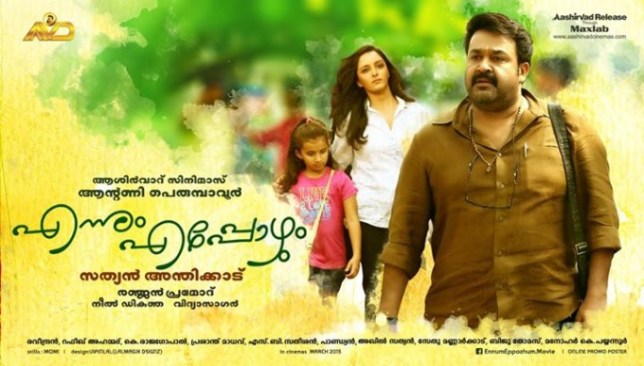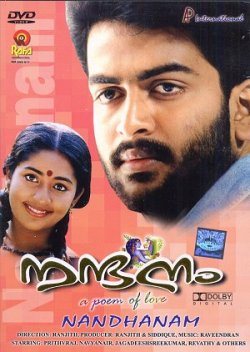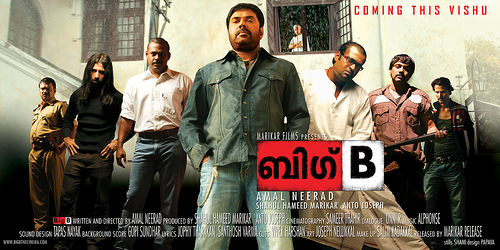
Mohanlal and Manju Warrier together sounds too good to miss but despite the casting and potentially interesting storyline, Sathyan Anthikad’s Ennum Eppozhum doesn’t quite meet up to expectations. The film tells the story of an erratic, middle-aged journalist and his attempts to interview a crusading local advocate but although the central storyline works well, diversions off the main path are rather less successful. However Mohanlal and Manju are excellent, the supporting cast is equally good and the down-to-earth ordinariness of the characters does work in the films favour.
Mohanlal is Vineeth N. Pillai, a lazy middle-aged bachelor who is notable more for his lack of hygiene and questionable work ethic than his skill with journalistic interviews. His lack of energy is noted by Vanitharatnam magazine’s new editor in chief, Kalyani (Reenu Mathews) which doesn’t bode well for Vineeth’s continued employment. Kalyani is just returned from London with plenty of new ideas and has no time for a slob of a journalist who doesn’t pull his weight. Luckily for Vineeth, the former chief editor still has a fond spot for him as the son of her dear friend and ensures that he gets a second chance to prove his skills.
Vineeth is sent to interview Deepa (Manju Warrier), an advocate who has been in the news for successfully campaigning to have potholes in the road fixed.
Deepa is the antithesis of Vineeth. She is a single mother and not only manages to raise her daughter, work as a successful advocate and campaign for better roads, but she also teaches dance and performs too, as seen in this beautiful piece from the film.
For more information on the dance style and more of Manju’s beautiful dancing check out the excellent post by Cinema Nritya here
In his attempts to speak to Deepa, Vineeth is accompanied by bumbling photographer Maathan (Jacob Gregory). Maathan also lives with Vineeth and the interactions between the two form one half of the comedy track to the film. The other half is supplied by a shady developer (Renji Panicker) and his inept security guard, but this is one of those diversions that doesn’t add anything to the storyline while the comedy is slapstick and not particularly funny. The comedy with Jacob Gregory also fails to raise much of a laugh but there are a few moments that warrant his inclusion. Vineeth is further hampered by his car that continually runs out of petrol, some dodgy advice from a young employee and his own inertia regarding the assignment. However as he watches Deepa, her busy life starts to make an impression and Vineeth is drawn into assisting when Deepa and her daughter are involved in an accident.
Deepa has her own problems to deal with, including her over-protective neighbour Kariachan (Innocent) and his wife Rosy (Usha S Karunagapally). They hover attentively around Deepa and her daughter Miya (Baby Adhvaitha) but seem to be more of a hindrance than a help. Deepa is also visited by a friend Farah (Lena Abhilash) who is another character who seems to run out of steam just when her story starts to get interesting. Farah talks about her marital problems which could potentially have been a major plot point, given that Deepa is also divorced from a rather obnoxious-sounding character. Instead the story goes nowhere and Farah’s inclusion seems fairly pointless except as a glimpse of ordinary middle class life in the suburbs.
There are more odd and pointless diversions that peter out just when they start to get interesting. Deepa has dealings with a gangster who seems to help her when she wants to keep some cases out of the court system. This had potential since Vineeth spots Deepa paying money to some shady looking characters, but instead the story fades away without reaching any resolution. Vineeth also seems to be on the cusp of developing a romance with Kalyani, who in turn has an amazing about-face when it comes to Vineeth and his work. For no apparent reason, other than perhaps a shared like of Rod Stewart songs, Kalyani decides that Vineeth can take as long as he likes to finish the interview, and even doesn’t seem to mind when he admits he may not be able to interview Deepa at all! The romance which almost starts in one scene then vanishes completely without Vineeth even appearing to notice.
The slow pace of the film suits the scenes of day-to-day living that form most of the story but it does mean that it takes a long time for Vineeth to approach Deepa. It takes even longer for the two to actually start speaking to each other, but when they do, they have a lovely and easy chemistry together. There is no real romance in the story, although the possibility is hinted at towards the end, but instead it is the characters and the details of their lives that are the focus of the story.
Ennum Eppozhum is at its best when showcasing the lives of the two main characters, their strengths and weakness and their interactions with the world around them. Without all the added threads that go nowhere this could have been an interesting picture of two very different personalities, but the noise created by the sub-stories dilutes the effect. However, it’s always good to have a strong female lead character and Manju Warrier is adept at portraying such roles. Mohanlal does an excellent job with his rather unpleasant reporter and yet still makes appealing enough that we want him to succeed and keep his job. Not a great film, but one still worth watching for excellent performances from all the cast and the pleasure of watching Manju Warrier dancing. It just could have been so much more. 3 stars.


































































